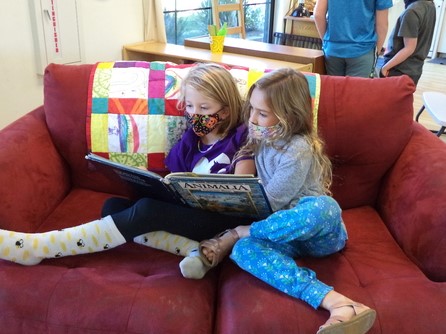(858) 759-0631
Do Unattended Children Become Independent or Victims of the Pediatric Patrol?
Free-range parenting is the concept of raising children in the spirit of encouragement to function independently and with minimal parental supervision. Based on the child’s development, geographic surroundings, and subsequent potential risks, free-range parenting has both backers and detractors. Here’s how one private school looks at the issue:
Pros of Free-Range Parenting
Key positive outgrowths of allowing our children to walk and play alone or with minimal supervision include:
-
Kids that play independently build confidence and skill
-
Experiencing risk can teach children consequences
-
Parents learn to stop worrying and hovering over their child’s every move
Cons of Free-Range Parenting
-
Where you live can make independent play difficult
-
How well you know your child is paramount
-
Cooped up kids don’t get enough exercise and never see nature
-
Today’s ‘neglect’ laws can interfere with parenting
-
The media has created an atmosphere that our kids are always in danger from strangers—and that is not so!
What One Expert Says
Today’s kids are missing the freedom and feeling the fear of free-range parenting.
Grandparents are realizing they scared their kids with "Stranger Danger" and now those kids have grown up keeping their own children inside.
One Parent’s Perspective
Or, as Rachel Nelli wrote, “I’m more concerned that my kids won’t get enough exercise and won’t learn how to solve problems for themselves; won’t learn how to make their own mistakes and pick themselves back up again; and, won’t be able to make decisions on their own. When it comes down to it, if someone wants to steal my kid, they could do it with me three feet away. But teaching my kids how to defend themselves, how to listen to their gut, how to use their brains to make decisions—that is more likely to save them than any amount of hovering.”
How The Montessori Method Teaches Children
A core tenant of The Montessori Method, a 110-year-old educational philosophy is this: kids learn better on their own by learning independence, consequences, and self-esteem by themselves--and at their own individualized learning speed.
We see that empathy, passion, and confidence are all happening by age six. Maria Montessori said that a confident and successful independent person starts early. So, parents need to give their children time to be kids and time to be purposeful, time to be on their own, time to look around at their surroundings, and the ability not to see the world as a place of absolutes.
Stepping back from coddling, overly protecting, and doing their children’s jobs for them will really help the child. Inasmuch as we think we are good parents because we lovingly do everything for our child, we’re not giving them the responsibility for doing things themselves, kids may grow up feeling loved and doing well academically but may carry doubts and insecurities as a result.
A Direction to Follow
Helicopter or hovering parents may be just as extreme as those who let their kids wander amuck. We should:
-
Let kids do for themselves
-
Let kids make mistakes--again and again--until they get it right
-
Let kids make grown-up decisions based on their actions
-
Let kids be kids
However, there is a middle ground where parents must let go and let their children be children. And, after making children aware of potential risks, give them the freedom to pursue the outdoors on their own or with others their own age. In that way, a balance might be struck between risk and reward to ensure that our children are capable, confident, and resilient.

